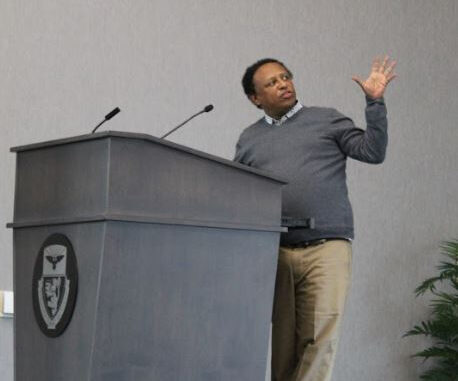
Eliyahu Gasson | Staff Writer
Semahagn Abebe fled Ethiopia to Germany in 2005 to avoid government political violence stemming from his teachings at Ethiopian Civil Service University.
On Tuesday, Abebe spoke at Duquesne about his war-torn homeland as part of a Human Rights class project.
“In June, 2005, many people were killed. Over 30,000 people were in prison,” Abebe said. “I was hiding for weeks because they were arresting any person who they thought was supporting the opposition groups.”
Clifford Bob, the professor of Human Rights, said the class chose what scholar they wanted to visit, and they were in charge of planning, promoting and communicating with community outreach organizations. Students were also tasked with participating in advocacy about human rights conditions in Abebe’s home country.
“From early in the semester, students work with the New York-based Scholars at Risk network, which the university is a part of, to identify at-risk scholars from other countries who would be a good fit for the course,” Bob said.
Abebe was born in Ethiopia and lived there until 2005, when he was forced to flee the country after the general election.
According to Abebe, these elections were the most competitive in the history of Ethiopia.
“There was more political space for opposition groups,” Abebe said. “I was involved with the opposition because some of the leaders of the opposition groups where my friends and I had been advising them.”
Abebe said that the opposition groups were optimistic, believing that they had an opportunity to enact political change. However, said Abebe, the election was rigged, and the ruling party, the Tigrayan People’s Liberation Front, had claimed victory before all the votes were counted.
He was ultimately driven out of Ethiopia due to the potential of political violence against him.
Abebe reached out to a professor from Germany who had been his teacher while he was working on his master’s degree in Addis Ababa. Abebe’s professor recognized his situation and aided him in finding scholarships so that he could move to Germany and continue his studies. Abebe said he made it out of Ethiopia and spent five years in Germany working on his Ph.D.
He came across the Scholars at Risk organization, which works to connect scholars at risk of violence and persecution in their home countries with temporary academic positions at foreign colleges and universities.
Bob said that Abebe was chosen to speak partly because he is a member of Scholars At Risk.
Emily Harling, a student in Bob’s class in human rights, said that those wanting to help scholars in similar situations to Abebe can do more.
“Our class learned how to write advocacy letters to our local representatives or others we felt were in a position to help such as non-governmental organizations,” Harling said. “The main goal of our letters was to raise awareness and promote accountability. Given the corruption within the Ethiopian government and the lack of free media, a lot of abuses are not talked about or accurately reported.”
Prior to fleeing Ethiopia, Abebe earned an undergraduate degree at Addis Ababa University, studied law for five years and became a public prosecutor.
“I like the job because it really gives me a sense of purpose – I could really help people who have been affected by crimes,” Abebe said.
Abebe said that the first few years he was working in the justice system, the government would not interfere with the courts. However, the government soon began to slowly politicize the justice system. The number of cases involving trumped-up charges against human rights activists and corruption among officials increased and Abebe felt he could no longer work as a prosecutor.
He then switched careers and began teaching at Ethiopian Civil Service University, which was established to increase the capacity of Ethiopia’s public sector. However, the university mainly educated individuals already working within the government.
“Even the president of the college was a central committee member of the ruling party,” Abebe said. “That’s where the problem started, because I was openly speaking about human rights violations.”
As a professor at the Ethiopian Civil Service University, Abebe would often share his previous court experiences in which he had to prosecute people who claimed they were coerced into false confessions with torture. Because of these lectures, his students who were linked to the Tigrayan People’s Liberation Front reported him, leading to a reprimand from the president of the university.
“That’s very difficult because when you are teaching human rights or conversational law or criminal law, it is very difficult for a professor to not really address normalization,” Abebe said.
Saffrin Schaeffer, a member of the events planning group, said the event took lots of coordination with her classmates and Duquesne staff.
“It is one thing to discuss these abuses in an academic setting, but to hear a firsthand account truly changes your perspective,” Schaeffer said.

